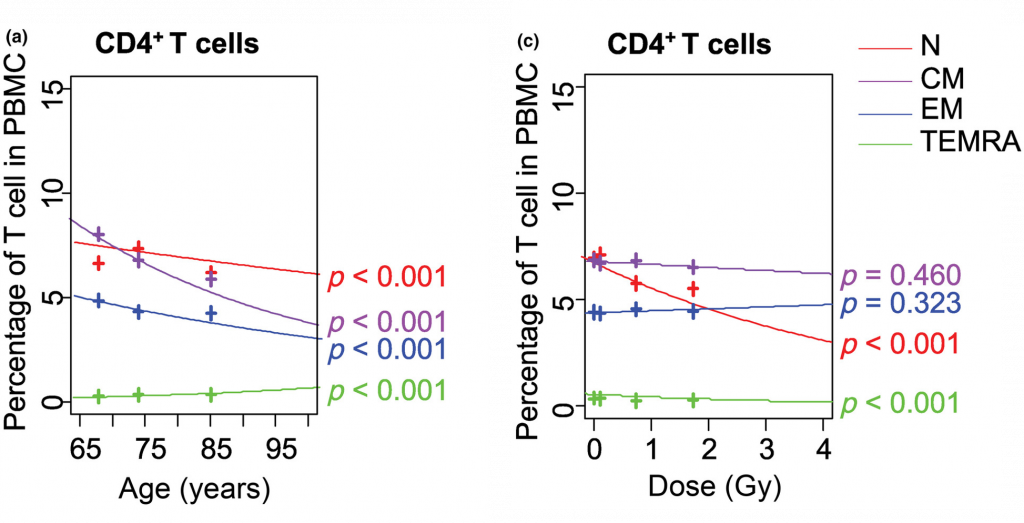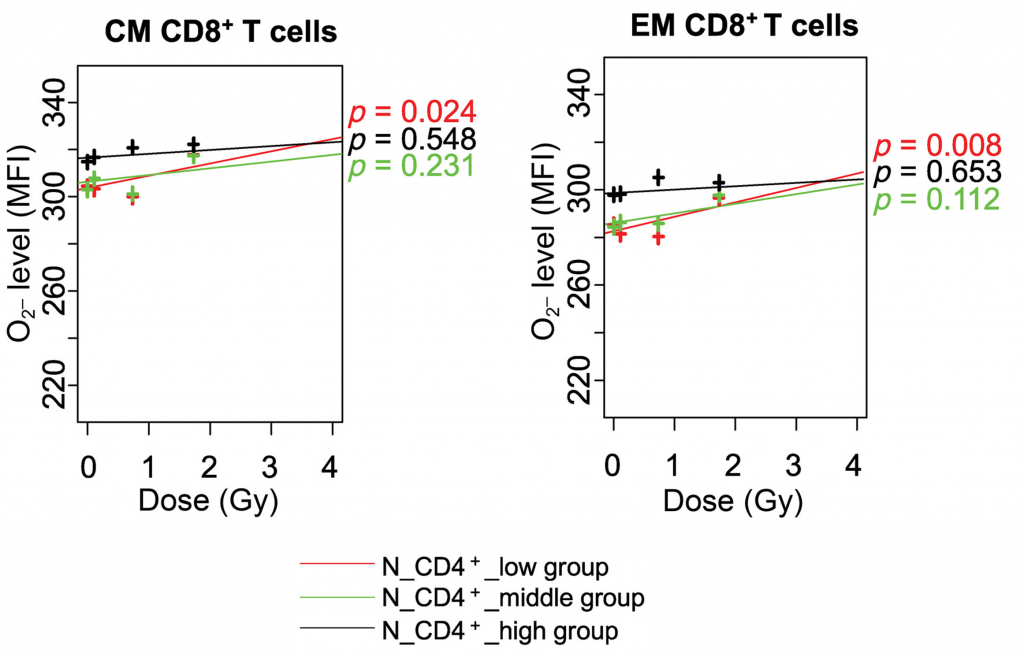Key Points:
- Both increased aging and atomic bomb radiation exposure are associated with the loss of immune cells called helper T-cells — important for fighting infection and disease.
- ROS levels within immune cells increase with increasing radiation exposure dose, suggesting that excess ROS levels accelerate immune system aging.
The immune system gradually declines with age leading to chronic inflammation, a major driver of age-related diseases, including cardiovascular disease, cancer, and diabetes. Now researchers from the Radiation Effects Research Foundation in Japan have found that immune system aging may be accelerated by radiation from the atomic bomb Dr. Oppenheimer — the father of the atomic bomb — helped develop.
As reported in Aging Cell, Hayashi and colleagues studied 3,752 World War II Hiroshima and Nagasaki bombing survivors. The Japanese researchers showed that the T cells of the survivors decrease with increasing age. Importantly, the T cells decrease further with increasing radiation dosages, suggesting age acceleration. Furthermore, it was shown that reduced T cells are associated with elevated ROS levels.
Atomic Bomb Radiation Accelerates Immune System Aging
With the first and last use of nuclear weapons in an armed conflict, the Japanese cities of Hiroshima and Nagasaki were bombed by the United States in 1945, prompting the end of World War II. While thousands upon thousands of mostly civilians were killed by these bombings, some survive to this day.
From 2008 to 2016, Hayashi and colleagues took blood samples from Hiroshima and Nagasaki survivors to examine their immune cells. Most of the participants were 10 years old or younger at the time of bombing and were around 75 years-old for the study.
To evaluate immune system aging, the researchers measured immune cells called T cells — a type of white blood cell that helps fight infections and diseases. They found that a major class of T cells called helper T cells (CD4+ T cells) decreased with increasing age. These findings confirm that helper T cell levels decline with age.
Additionally, it was found that helper T cells decrease with increasing levels of radiation exposure. Furthermore, the helper T cells decline faster with radiation exposure than with aging. These findings suggest that radiation exposure accelerates immune system aging by exacerbating helper T cell decline.

Since the drop in helper T cells signified accelerated immune system aging in atomic bomb survivors, Hayashi and colleagues divided the participants based on their helper T cell levels. Namely, the participants were divided into low, middle, and high helper T cell groups.
To assess ROS levels, the researchers measured superoxide (O2•−) — an oxygen molecule that is missing an electron — from a class of T cells called killer T cells (CD8+ T cells). Unlike helper T cells, which signal for other cells to destroy antigens, killer T cells destroy antigens directly. It was found that superoxide levels within killer T cells increased with increasing radiation exposure in the participates with the lowest levels of helper T cells. These findings suggest that radiation exposure accelerates immune cell aging by elevating ROS levels.

Overall, the findings of Hayashi and colleagues suggest that radiation exposure from nuclear war leads to accelerated immune system aging by elevating ROS levels. They say,
“Our findings may indicate a tendency for memory T cells to have higher intracellular O2•− levels in the event of new infection or cellular injury, which may result in persistent inflammation.”
Furthermore, previous studies have shown that atomic bomb survivors are at increased risk for cancer and heart disease. Therefore, radiation exposure could lead to age-related disease by dysregulating the immune system and promoting chronic inflammation.
Should We Worry About Aging Faster from Radiation ?
Earlier this year, the Doomsday Clock reached 90 minutes to midnight, meaning we are now the closest we have ever been to nuclear war. This is due to the current conflict between Urkraine and Russia, the latter of which is a nuclear superpower. However, the least of our worries should be accelerated aging in the face of modern nuclear war.
According to an article in Time, those who do not perish from the initial impact of nuclear missiles will eventually succumb to starvation. This is because the smoke from nuclear explosions will block the sun and cause temperatures to drop by as much as 20 degrees. It is estimated that about 5 billions people will die due to a lack of food from crops, which only grow at optimal temperatures.
Eventually, it is predicted that the light of the sun will no longer reach earth’s surface, making it difficult for life to persist. And other than nuclear war, the radiation levels we are exposed to on daily basis, and the radiation from the occasional X-ray or airplane ride may not accelerate the aging process. Only high doses of radiation exposure seem to result in accelerated aging. Therefore, we should not worry about radiation exposure accelerating our aging.